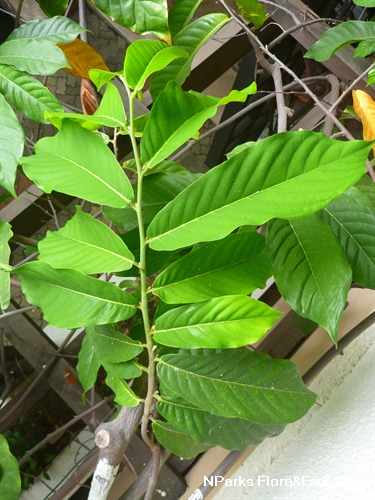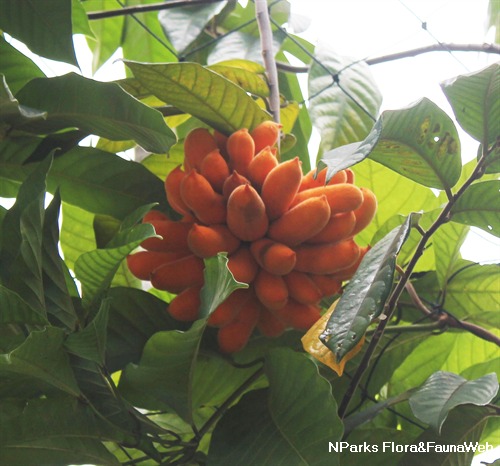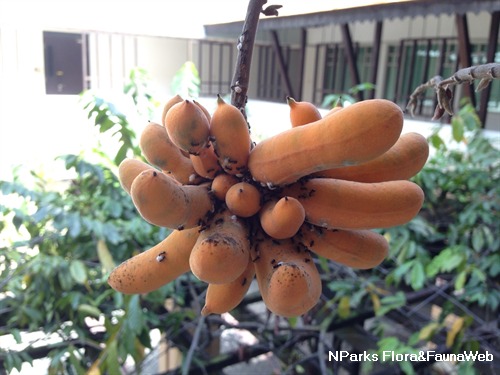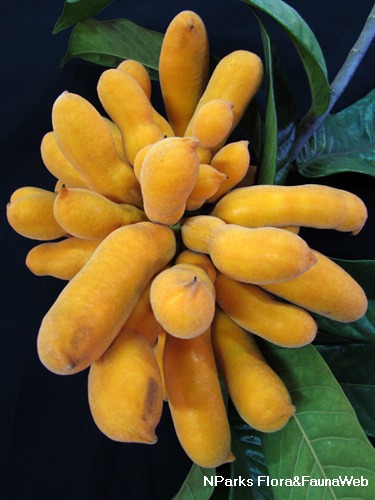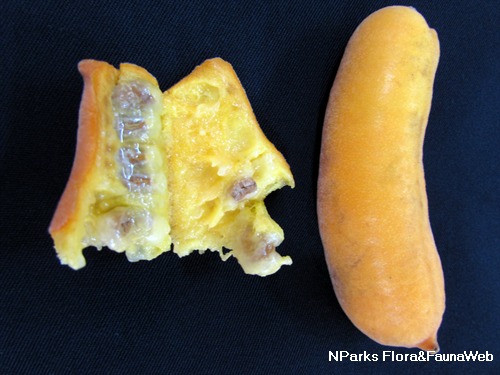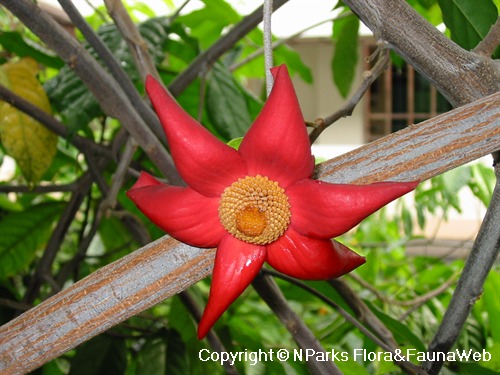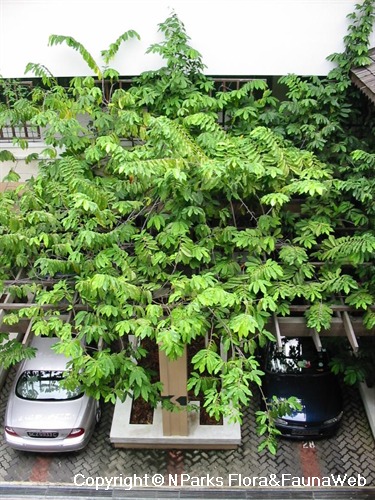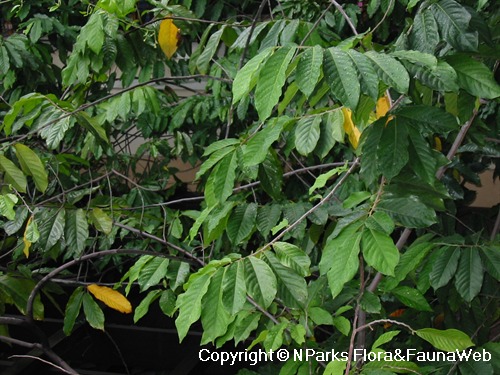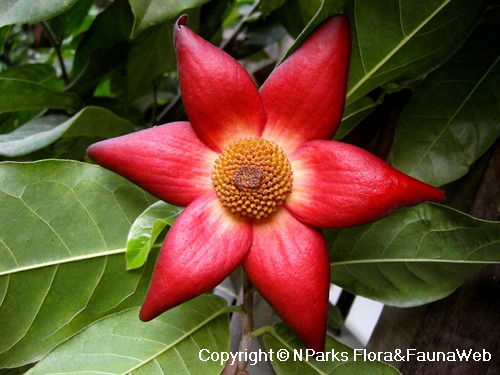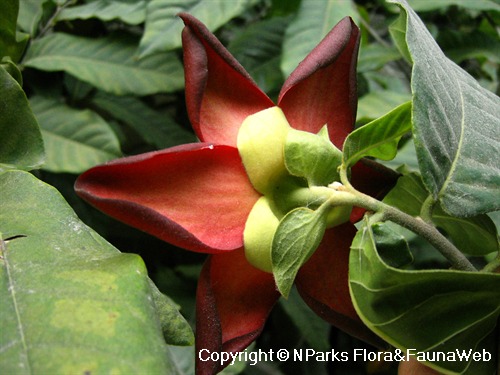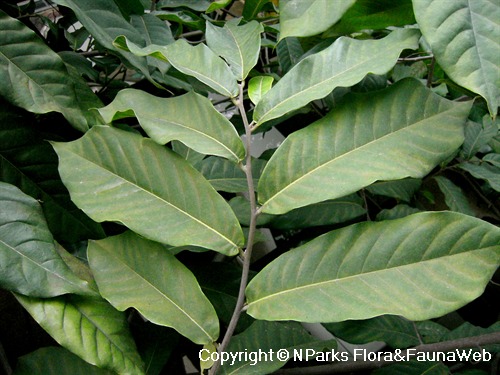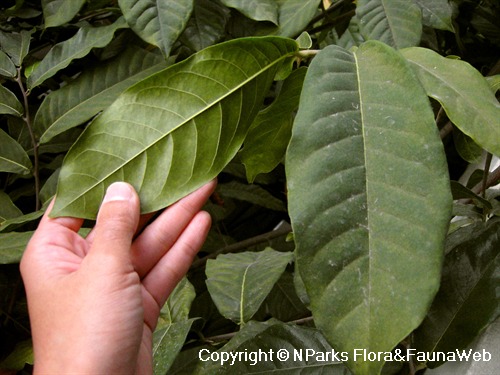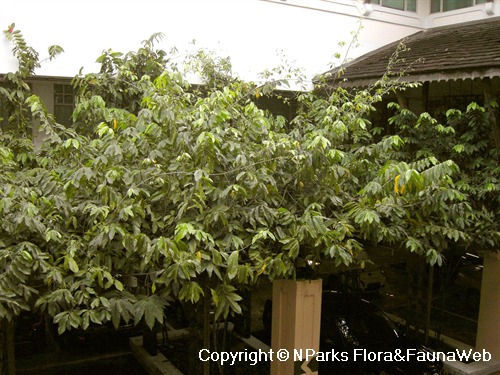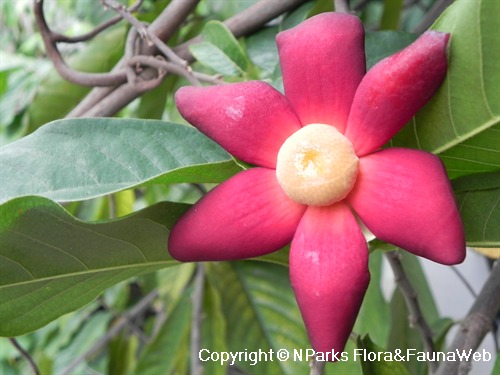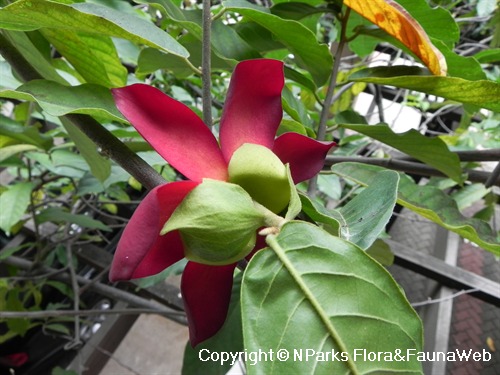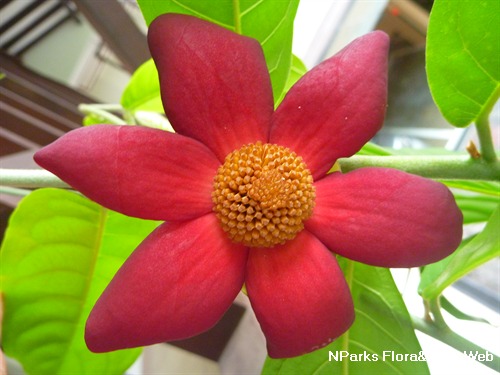
Back
Uvaria grandiflora (Lesch. ex DC.) Roxb.
| Family Name: | Annonaceae |
| Synonyms: | Unona rubra C.B.Rob., Uvaria rhodantha Hance ex Walp., Uvaria platypetala Champ. ex Benth., Unona purpurea Blume |
| Common Name: | Red Hot Poker, Pisang Akar, Akar Larak, 山椒子, 山椒, 大花紫玉盘 |
Commonly known as the Red Hot Poker, this Singapore native is a woody climber found naturally in rainforests. Its common name is derived from its bright red, eye-catching flower which resemble the hot glowing end of a poker. The climber is drought-tolerant, and is a food plant for the caterpillars of the Five Bar Swordtail (Graphium antiphates itamputi). It grows best planted on trellises and pergolas in parks and gardens.
Name
Classifications and Characteristics
| Plant Division | Angiosperms (Flowering Seed Plants) (Dicotyledon) |
|---|---|
| Plant Growth Form | Climber |
| Lifespan (in Singapore) | Perennial |
| Mode of Nutrition | Autotrophic |
| Plant Shape | Shrubby |
| Maximum Height | 10 m |
Biogeography
| Native Distribution | China, Laos, Vietnam, Laos, Peninsular Malaysia, Indonesia, Singapore, the Philippines, New Guinea, Thailand. |
|---|---|
| Native Habitat | Terrestrial (Primary Rainforest, Secondary Rainforest) |
| Preferred Climate Zone | Tropical, Sub-Tropical / Monsoonal |
| Local Conservation Status | Native to Singapore (Vulnerable (VU)) |
Description and Ethnobotany
| Growth Form | It is a woody, scrambling climber or shrub, up to 10 m tall. |
|---|---|
| Foliage | Its alternate, stalked leaves have thinly membranous blades that are oblong-lance shaped to elliptic-oblong, shiny dark green above and pale green below, and 11–23 by 6–9.5 cm. Its midrib is slightly depressed above, prominent beneath, and veins are prominent on both sides. The leaf stalks and young leaves are hairy. |
| Stems | The young stems are pubescent to tomentose. |
| Flowers | The solitary, bisexual flowers are opposed to the leaves and measure about 9 to 11 cm wide. The calyx consists of 3 yellowish sepals which are 2 to 2.5 cm long and are broadly triangular in shape. The corolla consists of 6 dark red obovate to ovate petals, 3.5 to 4 cm long. The flowers are slightly fragrant. |
| Fruit | Its orange and fleshy fruits compose of distinct, hairy fruitlets or carpels, each fruitlet is berry-like and cylindrical, 4–5.5 cm long, being slightly constricted around the brown seeds. Each fruit contains seeds that are flat, pale brown, and oval-shaped arranged in 2 rows. |
| Habitat | It grows in inland forests. |
| Associated Fauna | It is the preferred local food plant for caterpillars of the Five Bar Swordtail (Graphium antiphates itamputi). <1> |
| Cultivation | It is drought-tolerant. |
| Etymology | Genus 'Uvaria' means resembling a bunch of grapes, a reference to the clustered berries. |
| Ethnobotanical Uses | Edible Plant Parts : Edible Fruits Food (Fruit or Vegetable): Its fruits are aromatic, eaten raw or preserved. (Herb or Spice) Medicinal: In Malaysia, the leaves and roots are cooked and eaten to treat abdominal pains and skin diseases. The pounded leaves are used to treat putrefaction. Others: Its climbing stems are said to be good substitutes for rattans. |
Landscaping Features
| Landscaping | It is suitable for parks and gardens, on trellises and pergolas. |
|---|---|
| Desirable Plant Features | Ornamental Flowers, Fragrant (Bark, Flowers) |
| Landscape Uses | General, Vertical Greenery / Green Wall, Parks & Gardens, Trellis / Arbour / Pergola |
| Thematic Landscaping | Naturalistic Garden |
Fauna, Pollination and Dispersal
| Fauna Pollination Dispersal Associated Fauna | Butterfly-Attracting, Butterfly Host Plant (Leaves) |
|---|---|
| Pollination Method(s) | Biotic (Fauna) (Insects (Butterfly, Moth), Insects (Ant, Beetle, Fly, Thrip, Wasp)) |
Plant Care and Propagation
| Light Preference | Semi-Shade, Full Sun |
|---|---|
| Water Preference | Moderate Water |
| Plant Growth Rate | Moderate |
| Rootzone Tolerance | Fertile Loamy Soils, Well-Drained Soils, Moist Soils |
| Maintenance Requirements | Moderate |
| Propagation Method | Seed, Stem Cutting |
Foliar
| Foliage Retention | Evergreen |
|---|---|
| Mature Foliage Colour(s) | Green |
| Mature Foliage Texture(s) | Leathery, Raised / Sunken Veins, Glossy / Shiny, Thin |
| Foliar Type | Simple / Unifoliate |
| Foliar Arrangement Along Stem | Alternate |
| Foliar Attachment to Stem | Petiolate |
| Foliar Shape(s) | Non-Palm Foliage (Elliptical, Oblong, Oblanceolate) |
| Foliar Venation | Pinnate / Net |
| Foliar Margin | Entire - Wavy / Undulate, Entire |
| Foliar Apex - Tip | Caudate |
| Foliar Base | Acute |
| Typical Foliar Area | Macrophyll ( 182.25cm2 - 1640.25 cm2 ) |
Non - Foliar and Storage
| Stem Type & Modification | Woody |
|---|---|
| Root Type | Underground (Tap Root, Fibrous Root) |
Floral (Angiosperm)
| Flower & Plant Sexuality | Bisexual Flowers |
| Flower Colour(s) | Orange, Red |
|---|---|
| Flower Grouping | Solitary, Cluster / Inflorescence |
| Flower Location | Axillary |
| Flower Symmetry | Radial |
| Ovary Position | Superior / Hypogynous |
| Flower Lifespan on Plant | Several Days |
| Flowering Habit | Polycarpic |
Fruit, Seed and Spore
| Mature Fruit Colour(s) | Orange |
|---|---|
| Mature Fruit Texture(s) | Hairy / Hirsute |
| Fruit Classification | Aggregate Fruit (Syncarp) |
| Fruit Type |
References
| References | <1> Singapore Biodiversity Online. Retrieved from https://m.singapore.biodiversity.online/species/A-Arth-Hexa-Lepidoptera-000304 on 5 December 2024. |
|---|
Image Repository
Others
| Master ID | 231 |
|---|---|
| Species ID | 1527 |
| Flora Disclaimer | The information in this website has been compiled from reliable sources, such as reference works on medicinal plants. It is not a substitute for medical advice or treatment and NParks does not purport to provide any medical advice. Readers should always consult his/her physician before using or consuming a plant for medicinal purposes. |

.jpg)
